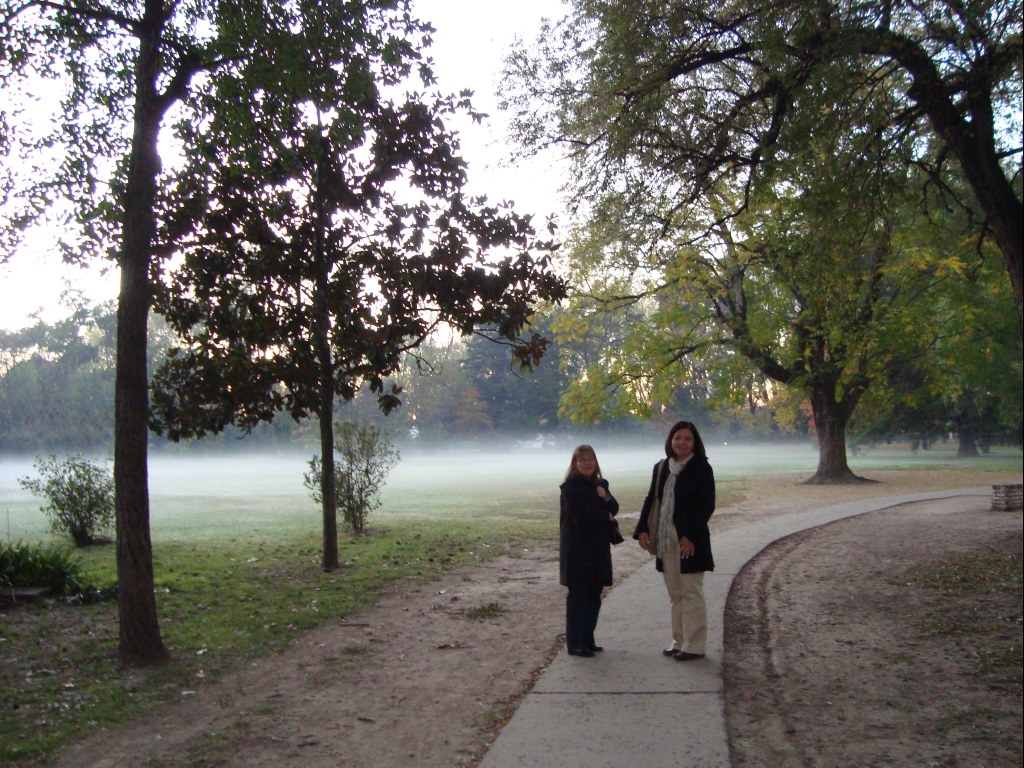
It should not surprise anyone that Luz Maria had a wonderful time in
Buenos Aires. She really impressed with the city's many parks and plazas, the clean streets and the classical architecture.
The
deaconess conference was held at a resort complex called
Las Clavelinas.
Argentina is a considerable distance south of the equator, so there are four seasons. But the order of the seasons is the reverse of that in
North America. Due to the tilt of the Earth's axis, the months when daylight hours are longest in the Southern Hemisphere are opposite of the
Northern Hemisphere.

Which is to say, it's autumn in Argentina right now. Luz Maria was enchanted by the changing colors of the trees, which you do not see in Venezuela. We are just a little north of the equator, so daylight hours vary only a little throughout the year. The sun rises and sets at nearly the same time all year round, so there is hardly any change in the seasons.
Luz Maria experienced a bit of culture shock in the area of social beverages. Coffee in Argentina was expensive and she find Argentine coffee to be rather weak (like North American coffee).
All coffee sold in Venezuela is espresso coffee, and the custom is to drink shots of coffee in tiny cups throughout the day. That is, except in the evening, when they serve "cafe con leche"
(coffee with milk) in large mugs.
On one of my first visits to Venezuela, another fellow gave me two bits of advice. First, I should consider marrying a Venezuelan woman, because they are the best in the world. Second, I
should get used to drinking at least four cups of coffee per day, the last one at 11 p.m. I took both of these suggestions to heart.
The hardest part about suggestion No. 2 has been getting used to coffee always being laced with sugar. Even if you ask for black coffee, they assume this means black coffee with sugar. Some place you can ask for "cafe guayoyo", which means a shot of espresso mixed with hot water and no sugar. Usually, in the coffee shops I ask for "cafe marron" (brown coffee), because this means coffee with a little milk and no sugar (although they do give you two sugar packets, in case you
want to add sugar).
At any rate, in Argentina, the social beverage really isn't coffee, but
yerba mate. The
yerba mate plant is a shrub related to holly, which is native to Argentina,
southern Chile, eastern Paraguay, western Uruguay and southern Brazil. It also has been successfully cultivated in Syria, Lebanon and Jordan.
Here's the idea: You have a little pot (traditionally made from a gourd) in which you mash up the yerba leaves, maybe with other medicinal herbs. Then you pour regular tea over this mash and sip from the infusion through a metal straw (often silver or silver-plated). Actually, you do not do this alone, but rather pass the pot around so your friends can take sips from it.
Luz Maria found this custom as odd as a
North American would and considered the sharing of a common pot unsanitary, but in Argentina it is considered rude if you do not take a sip.
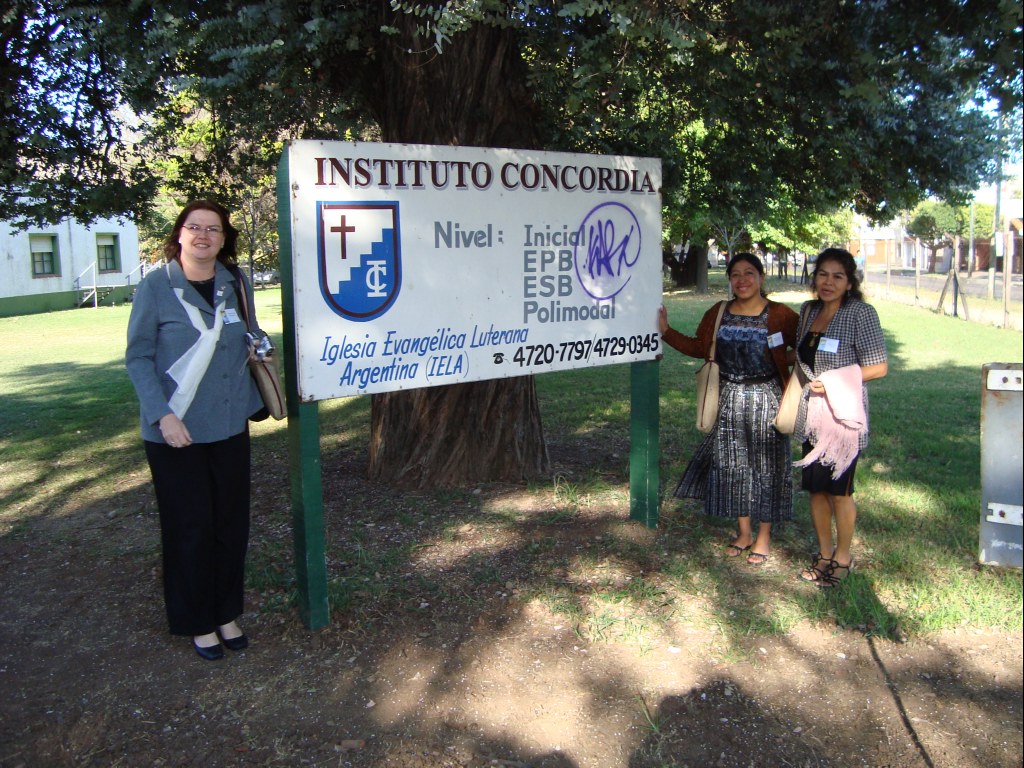
The deaconesses had the opportunity to visit
Concordia Seminary in Buenos Aires. This institution, founded in 1942, is small compared to say,
Concordia Seminary in St. Louis, with only about 25 students in residence. However, the seminary also maintains a theological education by extension (distance learning) program which involves about 500 students.
Luz Maria made many new friends and since her return has received e-mails from places as far away as Uruguay and Guatemala. She received a gift for the two of us from Dr. Arthur Just, professor of exegetical theology and director of deaconess studies at
Concordia Theological Seminary,
Fort Wayne, Indiana.

Although a native of Salem, Massachusetts, Dr. Just's family lived in Mexico and Spain for 12 years during his formative years, so he and Luz Maria were able to converse in Spanish. His gift was his book of devotions and prayers to use when visiting people in difficult circumstances, especially the gravely ill and dying. Dr. Just wrote an inscription in the book for Luz Maria in Spanish, but the book is in
English, so I have been reading it more than Luz Maria has.
Seminar in First TimothyLuz Maria also made the acquaintance of Pastor Roberto Bustamente, professor of New Testament studies and coordinator of the Buenos Aires seminary's theological education by extension program. He also is theological consultant for two series of children's books
published by Editorial Concordia, the
Spanish-language division of
Concordia Publishing House.
I met Roberto Bustamante myself the week after Luz Maria returned from Argentina. He was the instructor for a seminar on Paul's first epistle to Timothy, held in Caracas.
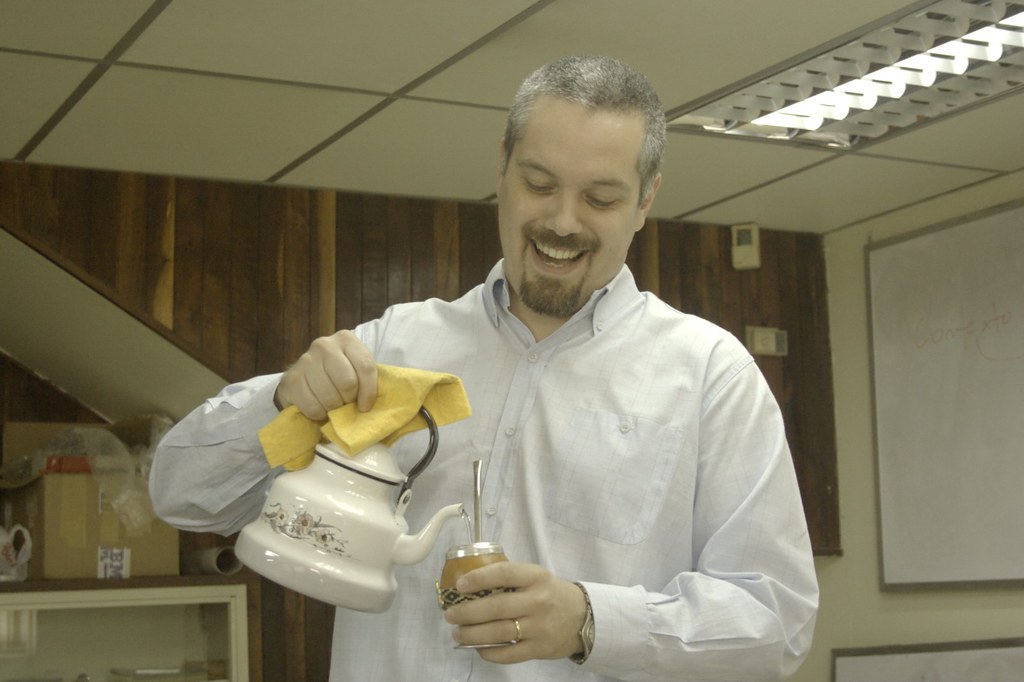
Pastor Bustamante had a supply of yerba leaves, but there were few people willing to share his yerba mate. I tried to explain to him about the casabe we had with our meals. Casabe is a flatbread made from cassava. Actually, it is made from a specific variety of cassava, which is found in eastern Venezuela, but not in the west.
Eastern Venezuelans love casabe, and since most of the people at the seminar were from the east, casabe was served almost every day. However, western Venezuelans have the same opinion of casabe as most North Americans: It tastes like cardboard.
A different type of cassava is used a potato substitute in western Venezuela. The whole tuber is either boiled or fried. McDonald's outlets in Venezuela often offer a choice of potato or cassava fries.
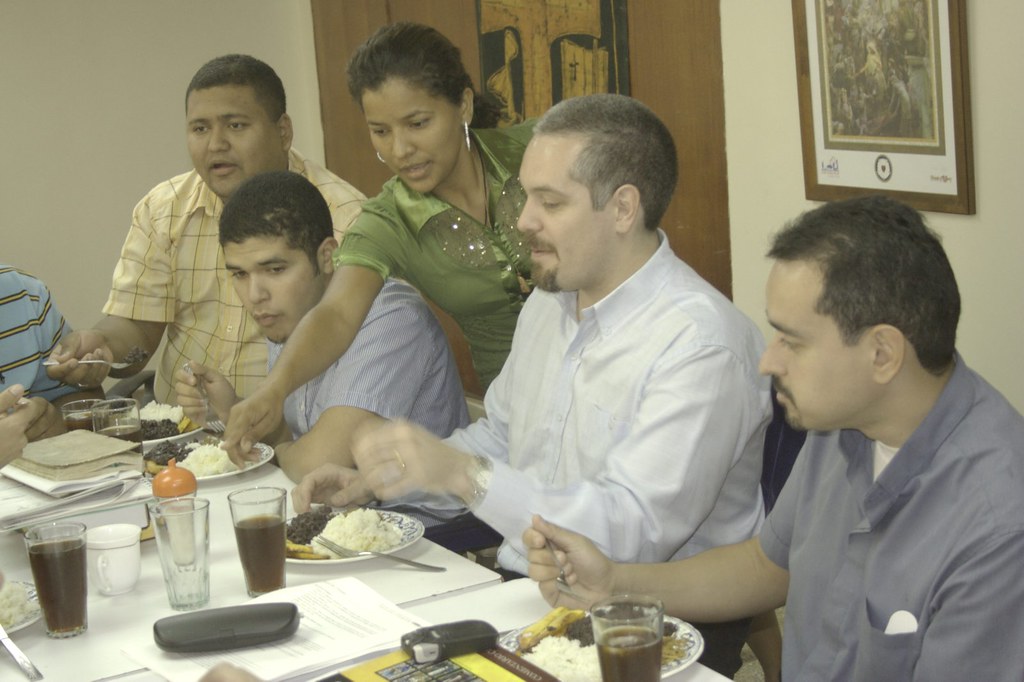
The plantain is another alternative to the potato. Plantains are like bananas, but not as sweet. In fact, they tast more like potatoes. Some people prefer fried plantain chips to potato chips.
The seminar was excellent. First Timothy is an important book of the New Testament, which deals with issues surrounding the church and the office of the public ministry. One of our
more interesting discussions concerned the identity and nature of the false teachers against whom St. Paul warns Timothy. There seems to have been two categories of false teachers
within the early church:
- The "judaizers", or those who taught that Gentile Christians had to follow all of the ceremonial and dietary laws of the Old Testament in order to be saved (something like present-day Seventh-Day Adventists, of which we have plenty here in Venezuela):
- Early Gnostics.
Both types may have been present in the church of Ephesus in Timothy's day and some passage suggest there may have been some affinities between the two. Thus, in the first chapter,
when Paul talks about the "fables and endless genealogies" that fascinate the false teachers, it could be a reference to the judaizers. Placing great importance on their Jewish background,
the judaizers would greatly concerned with pedigrees. In a similar passage in the epistle to Titus, Paul explicitly refers to "Jewish fables". But it might also apply to the Gnostics with their endless genealogies of spirit-beings and elaborate mythologies.
At least some of the false teachers may have had a foot in both the judaizer and Gnostic camps. This would be consistent with the idea that Gnosticism, or at least the variety of Gnosticism that the apostolic church had to deal with, originated during the Hellenistic era (roughly 323 to 146 B.C.) This was the time of the first great dispersion of the Jewish people throughout the Mediterranean world. The Gnosticism of the New Testament may have begun with attempts to synthesize Judaic theological speculation with religious ideas that were popular in the predominant Greek culture.
Mystical Judaism is still with us today in the form of groups like the Kabbalists (followers of the Kabbalah), who claim to have found hidden meaning in the writings of the Old Testament.
The Greek word, gnosis, means knowledge, and a common belief of the Gnostics was that the discovery of hidden knowledge or wisdom meant the liberation of the soul.
Another common belief of the Gnostics (for there were many different groups) was that the material world was inherently evil and that which was spiritual was inherently good. The human
soul belonged to the spirit world, so it was good, but it was imprisoned within the human body (which was bad).

This idea led the Gnostics in two different directions. One school of thought believed that the way to liberate oneself from the body was to practice a very ascetic lifestyle and abstain from all pleasures of the flesh, whether food or sex. Other Gnostics went completely the opposite way and said that, since the body was just a temporary shell eventually to be cast aside, one might indulge all one's appetites in whatever way one saw fit.
The more ascetic form of Gnosticism might have appealed to the legalistic Jewish convert to Christianity, while the Jewish ceremonial and dietary laws might have appealed to this sort of
Gnostic. There is historical evidence of at least, one Gnostic teacher, Cerinthus, who combined Gnostic and Judaism in just this way, insisting on complete obedience to the Old Testament law.
Cerinthus is believed to have been a contemporary of the Apostle John and, in fact, the Gospel of John may have been written to counter the teachings of Cerinthus.
Thus, in chapter four of 1 Timothy, when St. Paul warns against those who would forbid marriage and the consumption of certain foods, saying, "For every creature of God is good, and nothing
is to be refused if it is received with thanksgiving," he again could be speaking to both judaizers and Gnostics. Finally, 1 Timothy 6:20 seems to point directly at the Gnostics:
"Oh, Timothy! Guard what was committed to your trust, avoiding the profane and idle babblings and contradictions of what is falsely called knowledge..."
The judaizers might have "forbid marriage" simply because they did not approve of marriage between Jews and Gentiles. However, all types of Gnostics, both the ascetics and the libertines, had a profound distaste for matrimony itself and for reproductive sex.
This is important to understand because there has been a resurgence of interest in Gnosticism by people wishing for a more "feminist" form of religion. It has become almost customary every Easter season for someone to promote one of the bogus"Gnostic gospels", such as the
"Gospel of Judas" as an aalternative" interpretation of the life of Christ.
But the Gnostics were elitists, not egalitarians. Their Jesus was not the Savior of the world, Who came to redeem all who would believe, but a guru who revealed the secret knowledge to a select
few. Those who have this knowledge, whether male or female, are not bound by the petty rules that govern ordinary people, including the rules of gender. But that does not mean the Gnostics worshipped "the feminine principle" or were particularly interested in the rights of, say, single mothers.
Here is what the Gnostic "Gospel of Thomas" reveals about Gnostic attitudes:
"Simon Peter said to them, 'Let Mary leave us, for women are not worthy of Life.' Jesus said, 'I myself shall lead her in order to make her male, so that she too may become a living spirit resembling you males. For every woman who will make herself male will enter the Kingdom of Heaven.' "
The Judaizers denied the Gospel by denying that Jesus fulfilled all the messianic prophecies of the Old Testament and through His life of perfect obedience to the Father, all of the Mosaic law.
So, in the new covenant in His blood, salvation comes by faith alone, not by works of the law.
But the Gnostics denied the Gospel in two ways:
- By denying that all that God created is good and that evil entered the world only through man's disobedience;
- And that there will be a bodily resurrection to eternal life for all who believe.
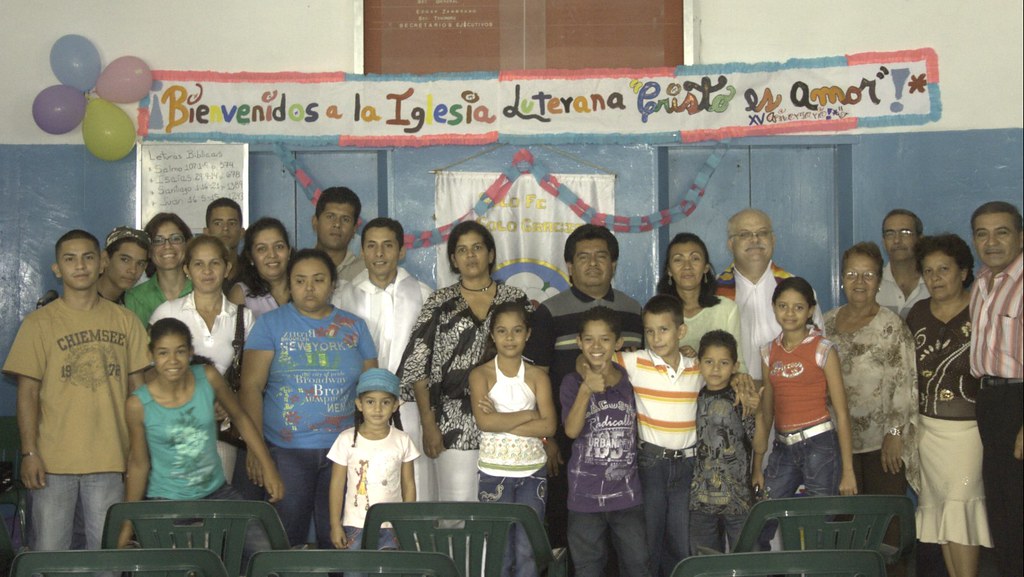 Fifteenth anniversary of Cristo es Amor
Fifteenth anniversary of Cristo es AmorFollowing the seminar in Caracas, I did not immediately return to La Caramuca, but rather traveled to Barquisimeto with Pastor Miguelangel Perez. He serves as national missionary
to two congregations and two mission stations there.
Teresa Leonbruni, a member of one of the congregations, Cristo es Amor (Christ is Love) Lutheran Church, wanted to donate some musical instruments to Corpus Christi Lutheran
Church in Barinas and to La Caramuca Lutheran Mission. So I went to Barquisimeto to personally accept the donation and to preach at Cristo es Amor, May 17, 2009.

It also happened to be the Sunday on which Cristo es Amor celebrated the 15th anniversary as a congregation. When I first visited Cristo es Amor in 2003, the congregation was meeting in a large, beautiful church building and Sunday attendance usually was more than 80 people. Much has changed since then.
First, a former pastor left the Lutheran Church of Venezuela, taking a large part of the congregation with him. This led to a prolonged struggle in which the original congregation lost
all of its property.
Membership dropped to between 15 and 20 people. This remnant was able to find a tiny storefront in downtown Barquisimeto in which to meet on Sundays. The rent was exorbitant, but at least they had a location.
A longtime Sunday school teacher, Jesus Franco, stepped up to the plate and became pastor of Cristo es Amor in 2005. The congregation rallied behind him, only to be rocked by his sudden death in 2007. Since then Cristo es Amor has not had its own full-time pastor.

However, the congregation now rents the lobby of a government building for a much more reasonable rent. It provides them a lot more space, although the only public restrooms are up on the third floor. The congregation now has around 25 active members and Sunday attendance
is increasing.
They set up the altar in front of the main elevators. I halfway expected someone to arrive from "on high" during the service, but that did not happen.
Since it was Rogate Sunday, I preached on John 16:23-30. I reminded them that "rogate" was the Latin root for the Spanish word "rogar" or "to pray". Rogate Sunday is especially devoted to prayer because in most parts of the world, it falls during the time of year when spring rains are
due to begin. If there is anything that people in farming communities pray for desperately, it is spring rain. John 16:23-30 records the first time that our Lord gave His disciples permission to pray in His name. With this authorization came the promise that God will hear all prayers offered sincerely in the name of Jesus, but without Christ as our Mediator in heaven, there is no such assurance.
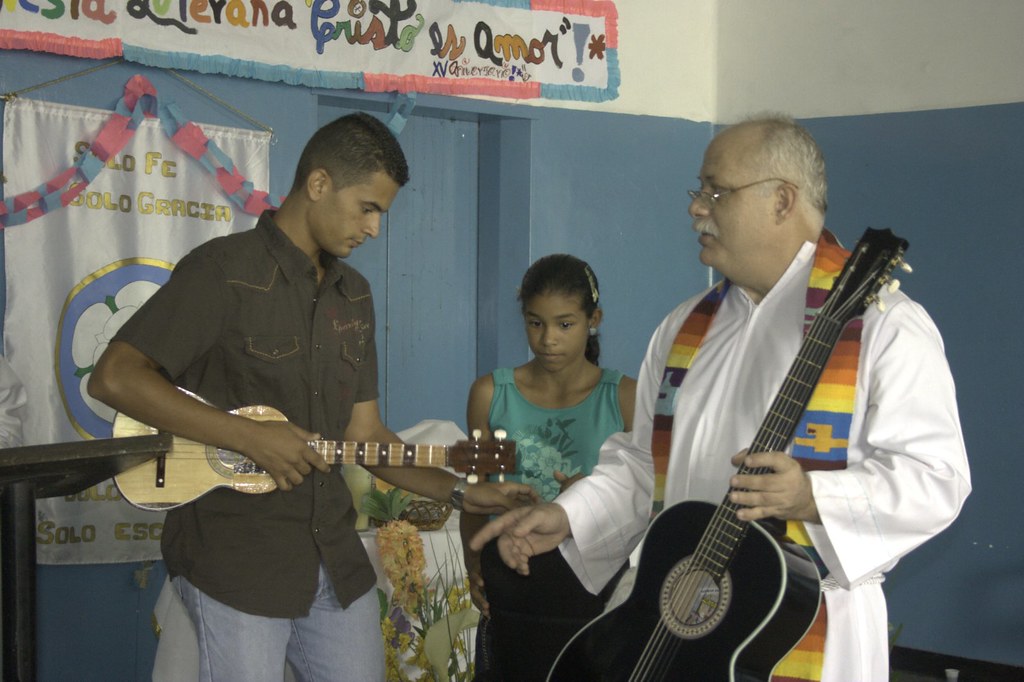
After the service I was presented with the musical instruments by Teresa Leonbruni's children, Omar and Genesis. They gave me a guitar for Corpus Christi and a cuatro (Venezuelan four-stringed guitar) for La Caramuca Lutheran Mission. Our mission now has three cuatros,
a six-stringed guitar and young people who want to learn to play these instruments. But we have to find a music teacher to instruct everyone in how to play them.
I was able to return that afternoon to lead worship in La Caramuca.
Mother's Day at the missionThe previous Sunday, May 10, in between Luz Maria's return from Argentina and my departure for Caracas, we observed Mother´s Day. Several of the mothers of the Sunday school children were in attendance. One mother was very interested in having her two children attend our new confirmation
class. We now have about six enrolled in the class, the problem is getting everyone to show up the same day at the same time.
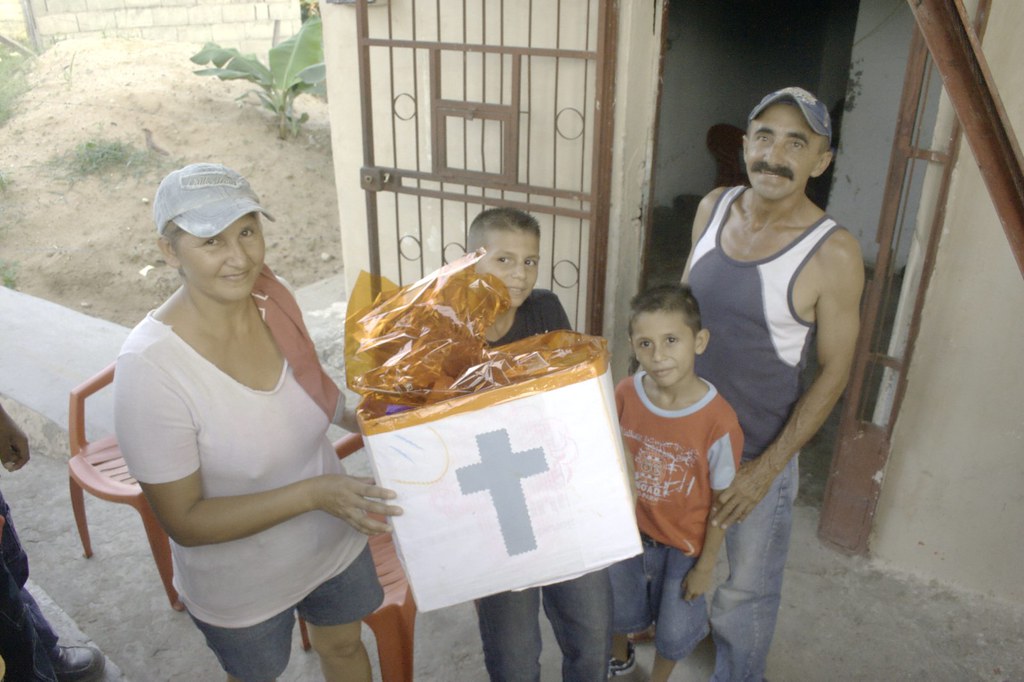
The appointed Gospel for May 10 was John 16:5-15, but since it was Mother's Day, I also quoted in the sermon from the Jubilate Sunday text, John 16:16-22. Specifically, the part about the troubles and trials of this world between now and the Lord's Second Coming are like a woman's
labor pains. I reminded the children of how much trouble it is for a woman to carry a child for nine months, and asked to think of how their mothers went through that pain for their sakes. Why would anyone endure it except that the labor pains are scarcely remembered, but the joy of having a child lasts for years and years.
Also that Sunday, we delivered a "care package" from Corpus Christi Lutheran Church to the Torres family in La Caramuca. The items in the care package were gathered by children receiving supplemental tutoring in their public school studies from Luz Maria´s daughter, Charli, at Corpus Christi on weekday afternoons.
 Let us pray together
Let us pray together 


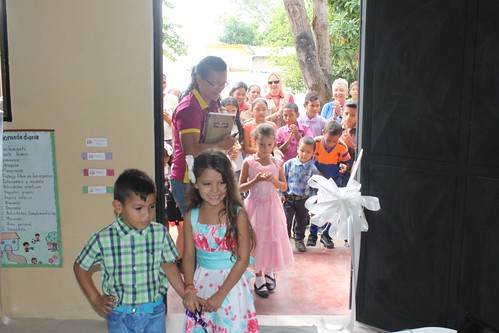
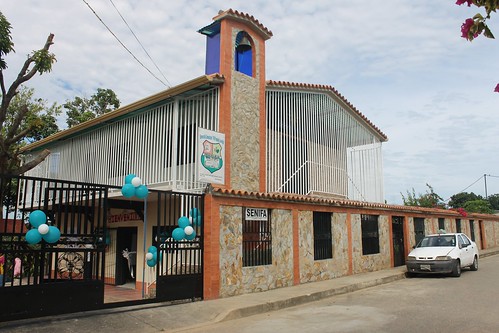


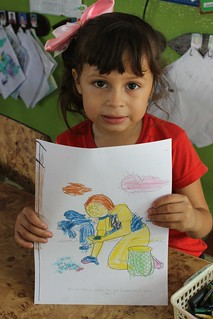
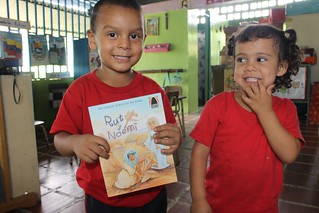




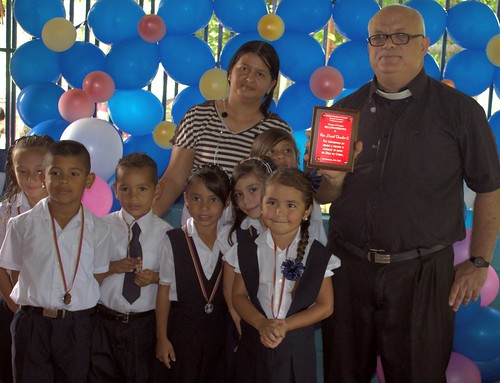
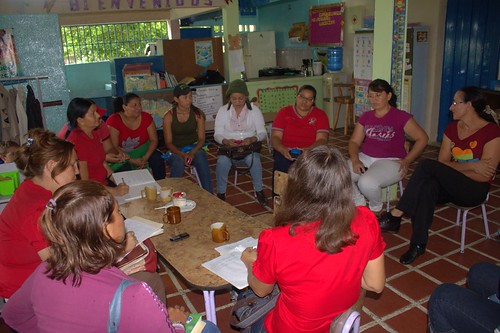


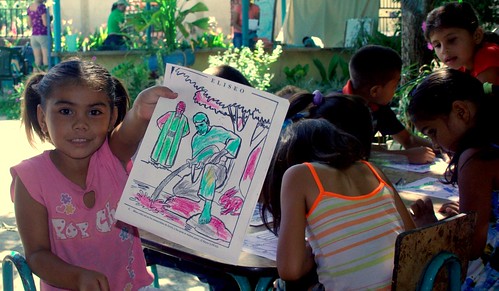
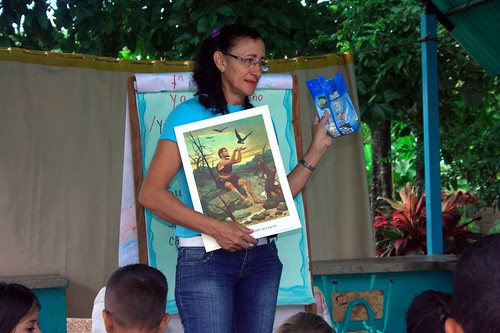
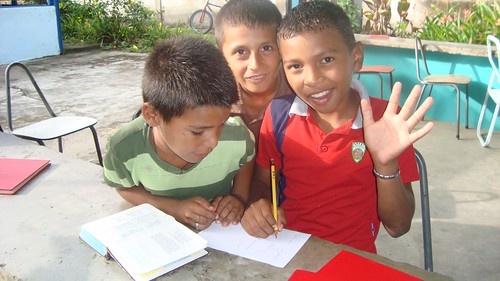
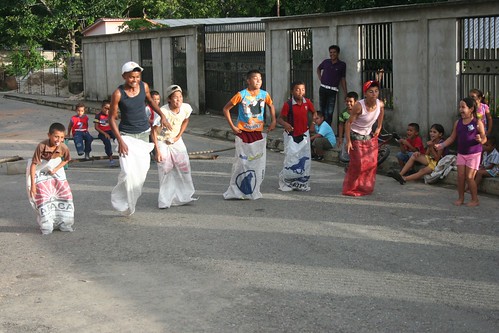

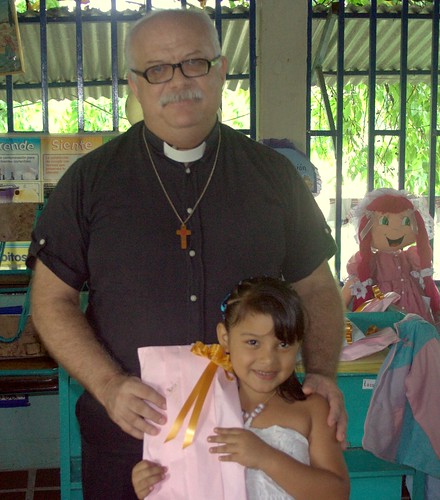

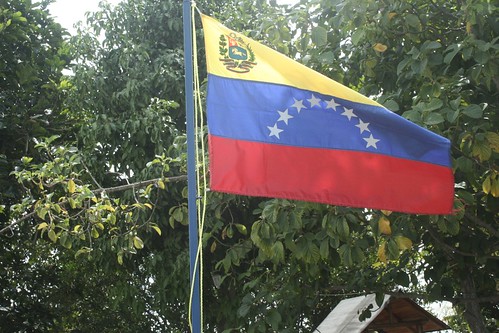

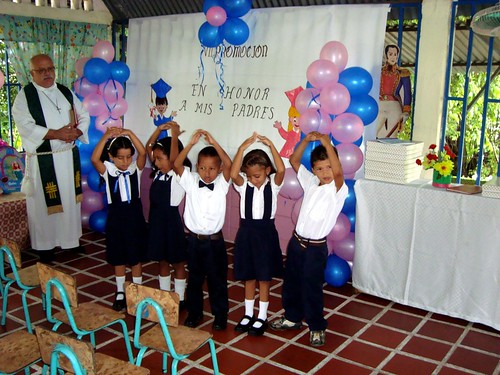





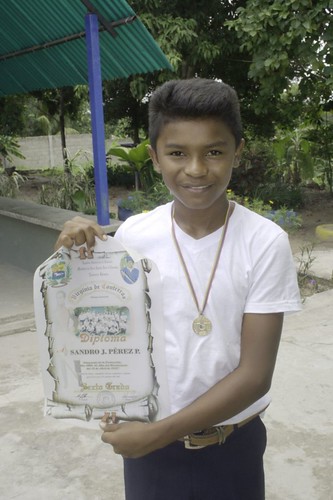
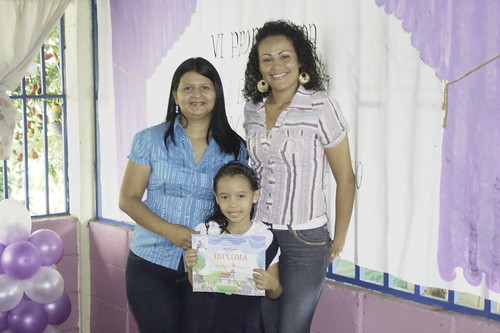
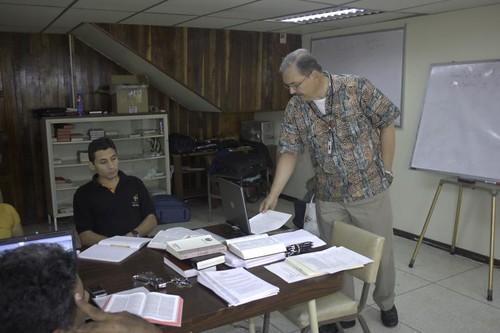
![Reblog this post [with Zemanta]](http://img.zemanta.com/reblog_e.png?x-id=806cdf2f-80cc-4106-b140-7305e17b6fe0)

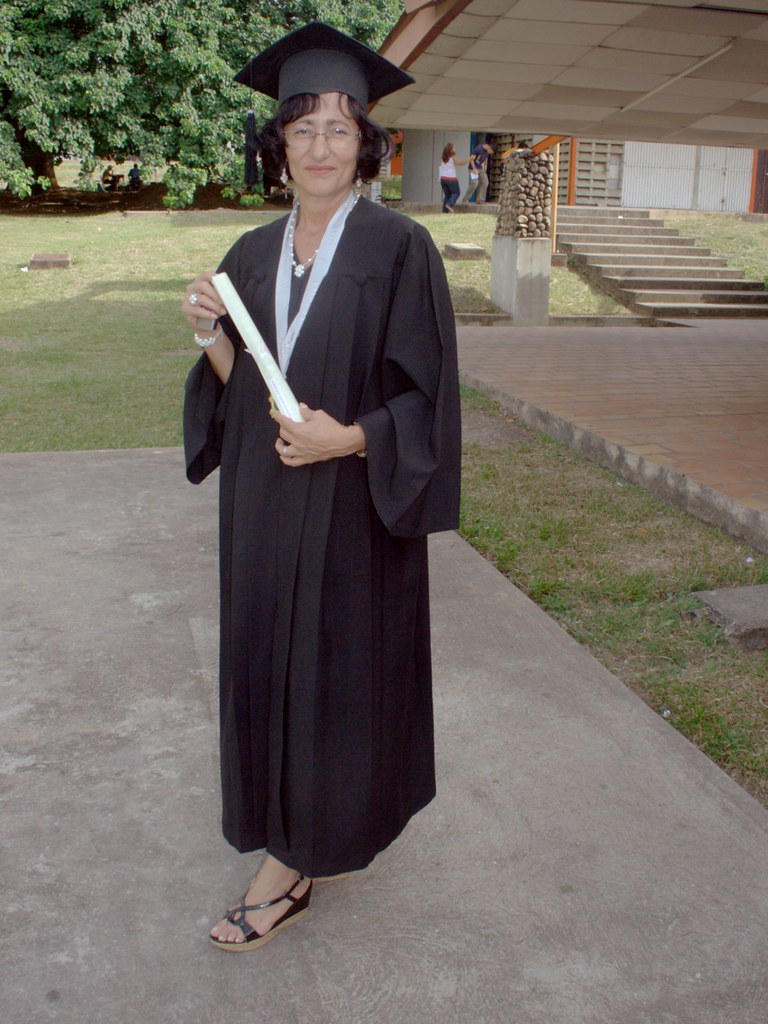
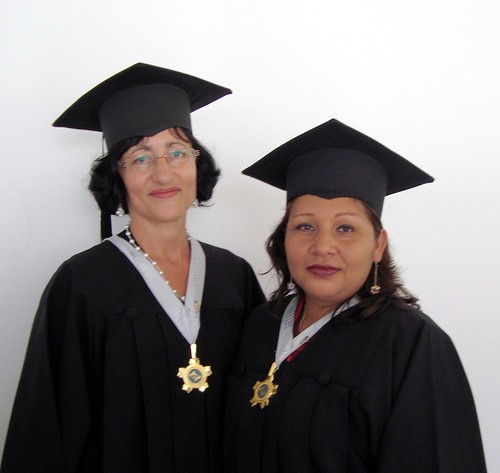
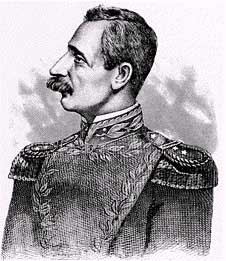

![Reblog this post [with Zemanta]](http://img.zemanta.com/reblog_e.png?x-id=d38176eb-d289-4fcf-9fe5-e5e34726a6c0)












![Reblog this post [with Zemanta]](http://img.zemanta.com/reblog_e.png?x-id=d789014c-e6ae-47ac-9115-81e80b87ed45)